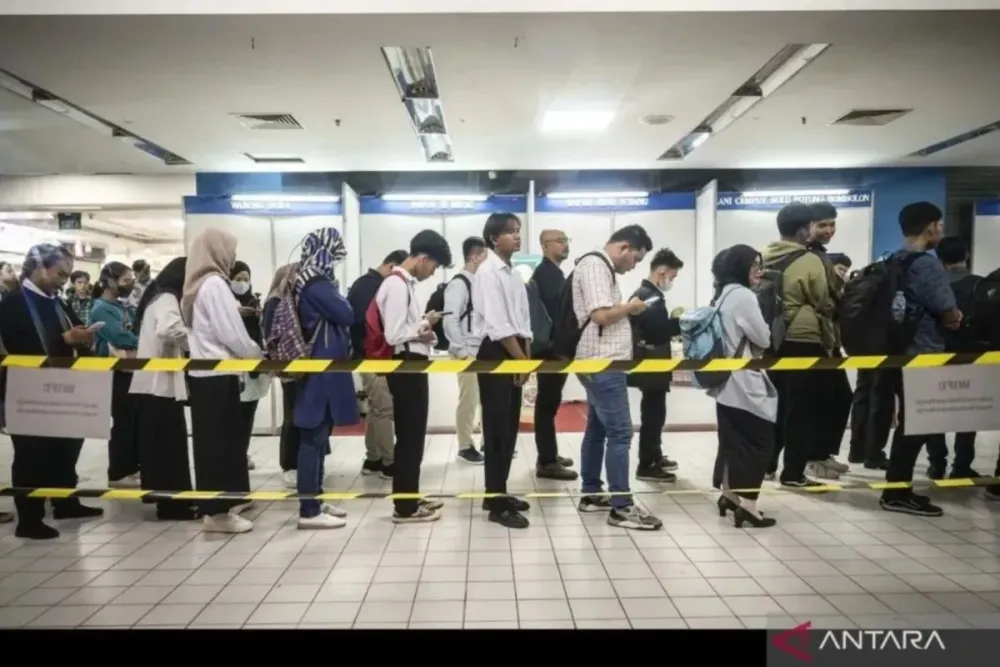Good morning Chief...
The following is important information related to the development of the business universe that needs attention today based on the curation of the SUAR Team.

Various Incentives to Boost the Economy Until the End of the Year
- In order to boost the sluggish economy and pursue a 5% growth rate, the government is preparing a number of incentives. These incentives are awaited by the business world, which needs a boost to drive the economy.
- These incentives include labor-intensive incentives for the transportation and public works sectors; Government-borne Value Added Tax (PPNDTP) for house purchases up to 100% in the second semester; discounted airline, toll road, and train fares ahead of the Christmas & New Year period; new worker recruitment prioritizing communities from the bottom economic deciles 1–2; and continuing BSU (Wage Subsidy Assistance).
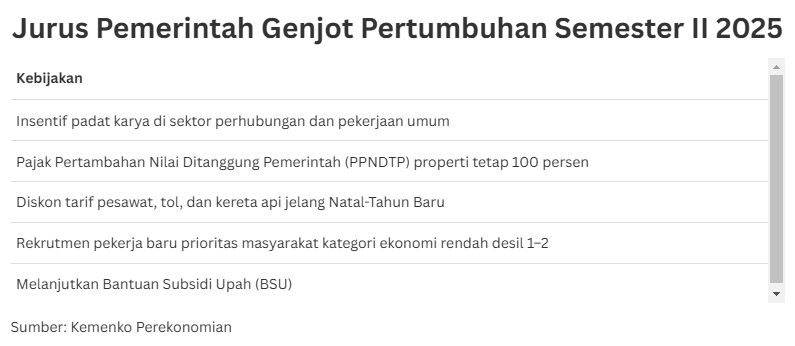
- Bank Indonesia (BI) is also providing monetary stimulus by lowering and also encouraging the economy by lowering the benchmark interest rate by 25 basis points to 5.25% at the July 2025 Board of Governors Meeting.
- Economic Policy Analyst of the Association of Indonesian Employers (Apindo), Ajib Hamdani, expressed his concerns regarding the decline in economic growth in Q1-2025 by 2.4% compared to the same period the previous year. Even though the first quarter is usually supported by the Eid consumption cycle, which increases the circulation of money. If there is no further intervention, the potential for economic growth in 2025 could even fall lower.
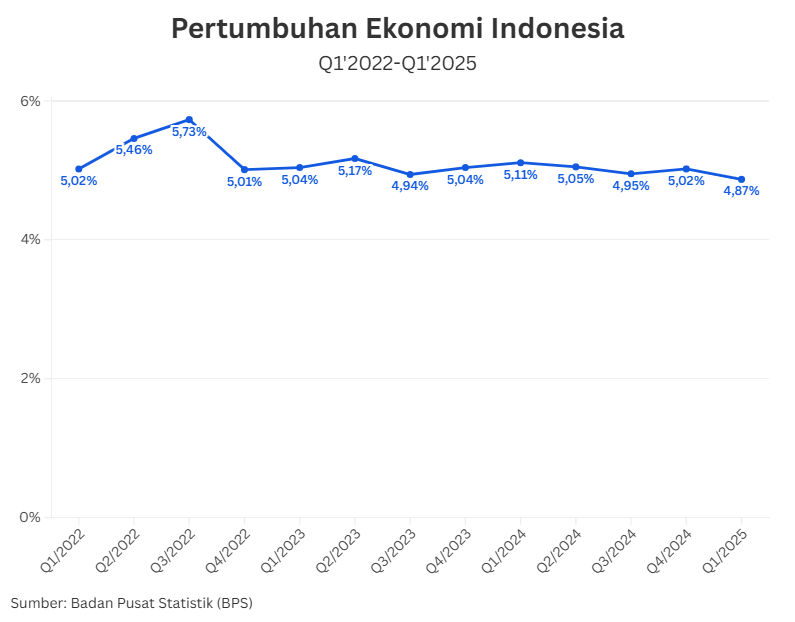
- In contrast to the government's optimistic narrative, which still targets growth above 5%, the latest research from the Center of Reform on Economics (CORE) research institute in the CORE Mid-Year Economic Review 2025 report published on Friday (25/07/2025). CORE projects that Indonesia's economic growth in Q2-2025 will only reach the range of 4.7%–4.8%, slightly down compared to Q1, which was recorded at 4.87%. In fact, throughout this year, the economy is predicted to remain at the level of 4.6%–4.8%, far from the government's ambition to maintain a minimum rate of 5%.
Read the full story here.

Understanding the Paradox of Poverty Patterns: Decreasing in Villages but Increasing in Cities
- The Central Statistics Agency (BPS), which released poverty figures for March 2025 on Friday (25/7/2025), stated that the total percentage of Indonesia's poor population as of March 2025 was recorded to have decreased to 8.47%. This figure is down slightly by 0.1 percent compared to September 2024. This is the lowest figure in the last two decades.
- BPS data states that the rural poverty rate fell from 11.34% in September 2024 to 11.03% in March 2025. Meanwhile, in cities, poverty actually increased slightly, from 6.66% in September 2024 to 6.73% in March 2025.
- The driving factor behind the declining village poverty rate is the increase in the farmer exchange rate (NTP) as one of the keys. The NTP figure in March 2025 reached 123.72, higher than the last time the poverty figure was released, namely the NTP in September 2024, which was 120.30. This means that the selling price of agricultural products is higher than the production and consumption costs of farmers. Purchasing power increases, and poverty decreases.
- Conversely, in cities, the slightly increasing poverty rate is a signal that cannot be ignored. Even though the figure looks small, the impact is real for millions of people who live almost below the poverty line. The increase in urban poverty is triggered by two major factors: rising food prices and the increasing number of semi-unemployed; people who have jobs, but work few hours or do not earn enough.
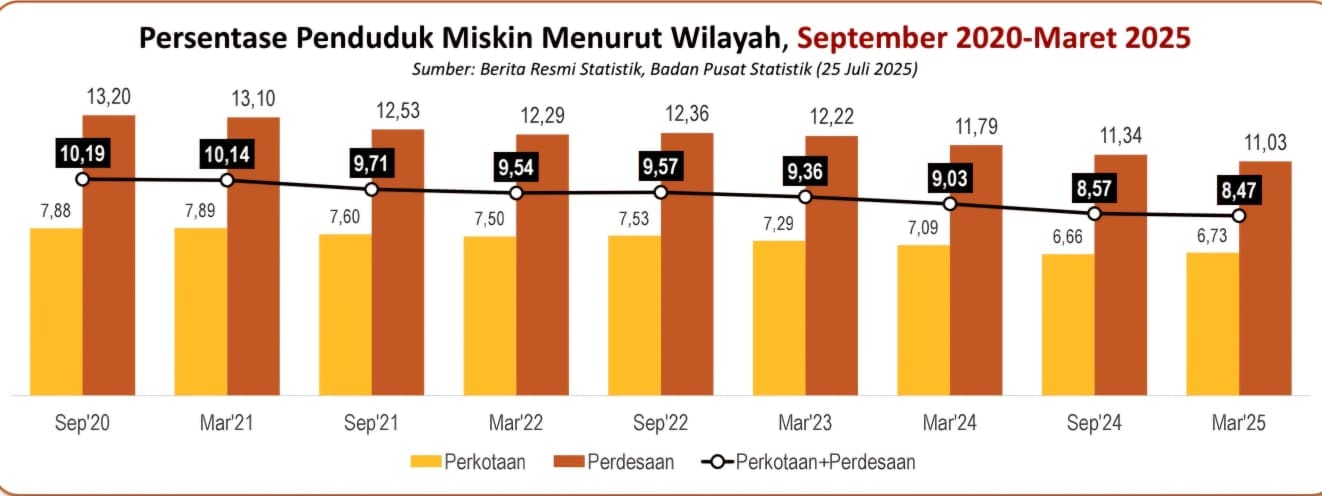
Read the full story here.
From AI to Biochar, Green Technology Approaches to Overcome the Climate Crisis
- Amidst the climate crisis, solutions are emerging through the use of green technology, ranging from artificial intelligence (AI) to Biochar.
- The use of big data and machine learning requires enormous energy and has an impact on increasing emissions, especially if it is not supported by clean energy.
- In addition to the use of AI, biochar technology has also emerged. This technology uses biomass to produce charcoal that can store carbon in the soil for hundreds of years.
Read the full story here.
State-Owned Banks Fund the Merah Putih Cooperative, Beware of Risks
- To support the success of the Merah Putih Village Cooperative (KDMP) program, the government has ordered the State-Owned Banks Association (Himbara) to be involved in funding this cooperative program.
- Deputy Minister of Cooperatives and Coordinator of the Daily Executive Chair of the Task Force for the Acceleration of KDMP Establishment, Putih Ferry Juliantono, explained that the initial financing for Kopdes will be channeled through a special People's Business Credit (KUR) with a ceiling of up to IDR 3 billion per cooperative.
- The interest rate charged is 6%, with a tenor of 6 years for working capital and 10 years for investment. The government is also proposing a grace period of 6 months to provide cooperatives with room to adapt in the early stages of operation.
- "The PMK (Minister of Finance Regulation) is currently being finalized at the Ministry of Finance. Then, we just completed the technical instructions for the operationalization of village pharmacies or village clinics. In the near future, the Minister of Energy and Mineral Resources Regulation regarding the distribution of 3 Kg LPG gas will also be issued soon," said Ferry in his press statement, July 15.
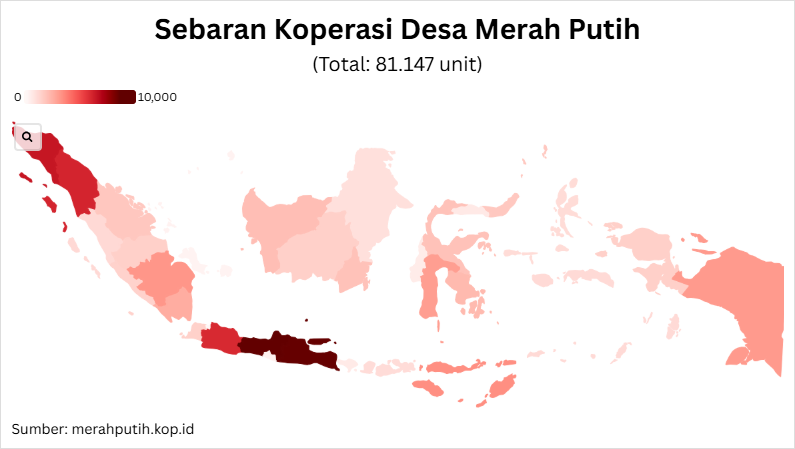
- To that end, as part of Himbara, Bank Mandiri is actively involved in assisting cooperatives designated as KDKMP launch points spread throughout Indonesia. At these cooperatives, Bank Mandiri has also prepared digital financial services such as Mandiri Agen and QRIS, and ensured the readiness of service infrastructure physically.
- President Director of BRI Hery Gunardi conveyed that the launch of KDMP by President Prabowo is an important momentum in building a foundation for an inclusive and sustainable people's economy. One of the real forms of BRI's commitment in providing convenience in accessing financial services for rural communities is through the presence of AgenBRILink which is integrated with cooperatives.
Read the full story here.

Indonesia's Nickel Pig Iron Production Outperforms China
- Since 2020, Indonesia's Nickel Pig Iron (NPI) production has outperformed China. Indonesia began to defeat China's dominance, which had been producing higher NPI since 2005. Nickel Pig Iron (NPI) is a component of pig iron containing 15 percent nickel ore.
- Based on data from the Indonesian Nickel Mining Association (APNI) released in July 2025, Indonesian NPI production in 2016 was at 0.1 million tons. This figure is still below China, which at that time produced 0.4 million tons. Gradually, Indonesian NPI production began to increase until in 2020 it was recorded at 0.6 million tons and could exceed the NPI produced by China by 0.5 million tons.
- The increase in Indonesian NPI production continued until in 2023 it was recorded at 1.3 million tons. Meanwhile, China's NPI production during the 2021-2023 period stagnated at 0.4 million tons.
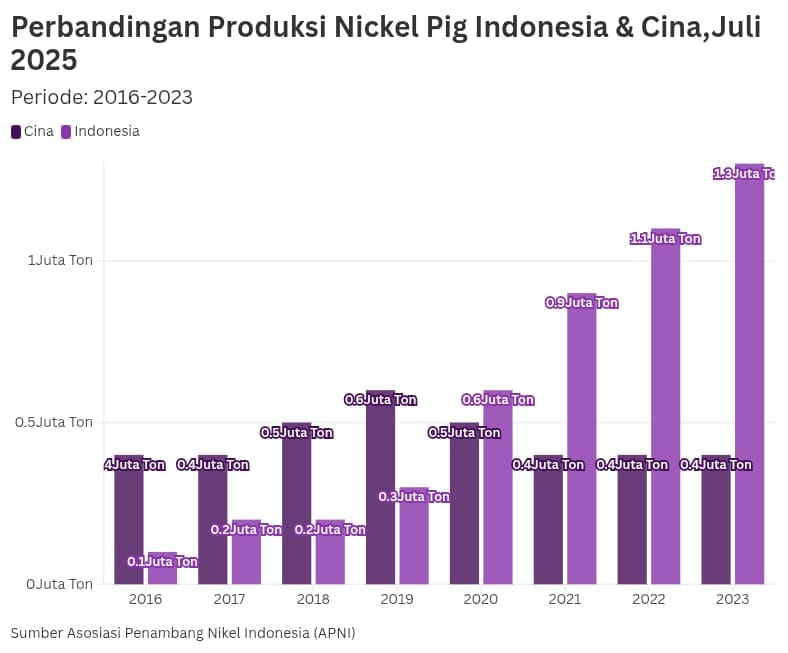
Read the full story here.

International Hijriah Food Festival 2025: The Indonesian Chamber of Commerce and Industry China Committee (KIKT) in collaboration with Khazanah Al Wahda Kreatif media dakwah, together with other communities, is organizing the 2025 international hijriah food festival in commemoration of the Islamic New Year 1446 H. This festival has been held since the beginning of July in several cities, now it is Solo's turn to host it on July 27 to 28, 2025 at Lapangan Pamedan Mangkunegaran, Solo, Central Java.
This festival showcases a variety of halal culinary delights from the Middle East, South, West and North Asia, where visitors can enjoy a variety of food choices. In addition, this event also presents various entertainment, children's games, to inspirational talkshows with guest star Habib Jafar. This event is open to the public free of charge.
Conference on the Results of the KSSK III Meeting 2025: The Financial System Stability Committee (KSSK) is again holding a conference on the results of the third meeting in 2025, on Monday, July 28, 2025 at 16.00 in the Excellence room, Pacific Century Palace tower 30th floor, Deposit Insurance Corporation (LPS) Building.
This event was attended by high-ranking officials of the state financial system, namely Minister of Finance Sri Mulyani, Governor of Bank Indonesia (BI) Perry Warjiyo, Chairman of the Board of Commissioners of the Financial Services Authority (OJK) Mahendra Siregar, and Chairman of the Board of Commissioners of LPS Purbaya Yudhi Sadewa. This meeting is a routine meeting held to discuss and evaluate the financial system, which is held every three months in a year.
In the first quarter, the results of the meeting confirmed that the stability of the financial system was maintained despite the US President Donald Trump's policy tariff conditions. Then the second quarter agreed to increase vigilance and strengthen coordination and policies for the future, while the third quarter is still awaiting the results of the meeting which will be announced on July 28.

"A big dream is the first step to achieving success. Don't be afraid to dream and start working from the first step." Jack Ma (Founder of Alibaba)
Have a good day Chief.
Team SUAR





